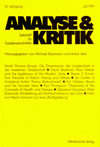ohne Titel

1982 (4) Issue 2
Table of Contents
Title: G. A. Cohens materialistische Geschichtstheorie. Einige Einwände - Überblick zu einer Diskussion
Author: Anton Leist
Page: 131-158
Abstract: During the last years Anglosaxon discussion about Marx and Marxism has been characterized by an intensified interest in historical materialism as a general theory of history. The most extensive, careful and analytically rigorous among several new treatments is the one by G. A. Cohen, which is the subject of four critical articles in the present issue of ANALYSE & KRITIK. To make these articles and Cohen's project understandable to the German reader, an attempt is made in the following to summarize the main arguments of Cohen's defence of historical materialism and of the ensuing comprehensive and detailed discussion.
Title: 'Productive Forces' and 'Relations of Production' in Marx
Author: Wal Suchting
Page: 159-181
"5. Dialectics of the concepts productive force (means of production) and relation of production, a dialectic whose limits are to be defined, and which does not do away with real differences." (K. Marx, Grundrisse, lO9/MEW l3, 64O)
Abstract: This paper criticises the view that, accordinq to Marx, "productive forces" determine "relations of production" and that the growth of the former basically determines the course of history. The particular version of this account discussed is that to be found in G. A. Cohen's "Karl Marx's Theory of History: A Defence". The main part of this criticism involves a presentation of what, it is suggested, was in fact Marx's conception of "productive forces", "relations of production" and their relations, and an identification of class-struqqle as the primary factor at least for the historically significant periods with which Marx was concerned.
Title: The Concept of Primacy in Historical Explanation
Author: Milton Fisk
Page: 182-196
Abstract: G. A. Cohen interprets Marx as a technological materialist; the productive forces are "primary" in history. There are several mistakes here. First, for Marx technology is neither always nor predominantly the direct stimulus - either causal or functional - of the social relations of production. Second, it is not even the case that for Marx primacy in explanation is a matter of being a direct stimulus. It has to do rather with being a framework that underlies interconnections between direct stimuli and their results. It turns out that this framework cannot be technology but only the relations of production. Third, technological development is not an autonomous process but is for Marx one that is dependent on the cooperation of producers. This introduces the political element of the class struggle into technological development and refutes a technological reading of why a given class rules.
Title: Das grundlegende Puzzle des historischen Materialismus
Author: Philippe Van Parijs
Page: 197-210
Abstract: How is it possible, at the same time, to claim that there is a causal primacy of the productive forces over the relations of production and to recognize that the development of the productive forces causally depends on the nature of the relations of production? This irritating puzzle, which threatens the very core of historical materialism, had never received a satisfactory solution until G. A. Cohen's Karl Marx's Theory of History. The latter asserts that only a functional interpretation of historical materialism can effect the required reconciliation. On one reading of the "primacy puzzle", however, this claim turns out to be trivial, while on the only other plausible reading it turns out to be false. Having delineated this dilemma, the article sketches an alternative solution.
Title: Can the Base be distinguished from the Superstructure?
Author: Steven Lukes
Page: 211-222
Abstract: This article considers Cohen's claim that the economic structure or base can be conceived independently of the superstructure by adressing his attempt to identify "a rechtsfrei (moralitätsfrei, etc.) economic structure to explain law (morals, etc.)". It examines his programme of presenting relations of production as a set of (non-normative) powers and constraints that 'match' the rights and obligations of property relations. It is argued that, first, Cohen does not carry through this programme rigorously but, second, he could not do so, since it cannot be carried out at all. Three arguments are advanced, the first two against the possibility of a determinate ,objective, account of such powers and constraints, the third against the possibility of abstracting norms (constitutive and regulative, formal and informal) from contractual relationships: it is argued that one cannot identify the powers and constraints embodied in norm-governed economic relationships independently of the norms which govern them. Alternative interpretations are considered of Cohen's programme that might escape these objections, but these are rejected as untrue to his purpose, and in any case ineffective. It is concluded that Cohen fails to distinguish base from superstructure in the manner required.
Title: Richard Rorty and the American Philosophical Scene
Author: Robert G. Turnbull
Page: 223-238
Abstract: Richard Rorty's assessment of the American philosophical scene is unduly cynical. Part of the reason for this seems to lie in his recognition (in Philosophy and the Mirror of Nature) of the incoherence of "grounding" a linguistic or conceptual scheme on a "given", but proceeding, nevertheless, to think of representation and truth as requiring conformity to a "given". He, therefore, fails to appreciate the unity and seriousness of American philosophers who, abandoning the "given", are working with some success on plausible accounts of representation and truth. Surprisingly, neither in his article nor his book does he attend to the remarkable increase in sophistication and serious research on the part of historians of philosophy and historians of science. Both in serious work on representation and truth and in historical research there is more rapprochement between American and Continental philosophers than Rorty seems prepared to credit.